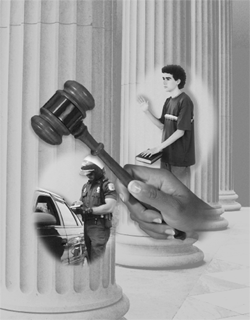
I recently represented a client for a DUI / OVI in a juvenile court near Columbus, Ohio. The case went to trial, and I was sharing my experience with a colleague. The colleague happened to be coordinating a DUI / OVI seminar for the Columbus Bar Association, and he asked me to speak at the seminar on the topic of handling DUI / OVI cases in juvenile court. The topic is a good one because most attorneys do not regularly represent clients for DUI / OVI in juvenile court, and there are some differences between juvenile cases and adult cases.
One issue that comes up in juvenile DUI / OVI cases that does not really come up in adult DUI / OVI cases is venue: where the case will be heard. There seems to be some misunderstanding about the juvenile’s ability to transfer the venue. Ohio law says the complaint (the traffic ticket) may be filed either in the county of the juvenile’s residence or the county where the offense occurred. If the ticket is filed in the county where the offense occurred, it can only be transferred to the county of the juvenile’s residence if the judge authorizes it. Even then, either judge can order that the trial be held in the county where the offense occurred. There is a little-used paragraph of Juvenile Rule 11 that says the case must be transferred if the juvenile has a pending case in the county of the juvenile’s residence. So, if you want the case to be heard in the county of the juvenile’s residence, simply have the juvenile get charged with a minor offense like littering in his home county!
Another issue that is unique for juveniles and drivers under age 21 is the level of proof required to arrest the driver for DUI / OVI. As the ‘legal limit’ for drivers under 21 (.02) is lower than the limit for drivers over 21 (.08), the question becomes whether officers need less evidence of intoxication to justify arresting a driver under 21. The answer depends on where the case is being heard. Ohio has 12 appellate districts. Some of those appeals courts say less evidence is required, some of them say the same level of evidence is required, and some of them have not addressed the issue.
The phase at which juvenile DUI /OVI cases are the most different than adult DUI / OVI cases is the sentencing phase. Actually, in juvenile court, it’s called the ‘disposition’ hearing; the terminology in juvenile court is in many ways different than the terminology in adult court. For a juvenile that is found guilty (‘adjudicated a juvenile traffic offender’), there are three types of license suspensions that may be imposed: a mandatory six-month suspension from the Ohio B.M.V., a mandatory suspension from the court that is three months to two years, and a discretionary suspension from the court that is up to two years.
Unlike suspensions for adults, juvenile suspension can sometimes be terminated early by the judge if the juvenile completes an alcohol/drug treatment program. While a juvenile cannot be given a jail sentence for up to six months like adults, Ohio law does allow for confinement for up to five. For a juvenile to reinstate his or her driver’s license, the juvenile must complete a juvenile driver improvement program and must also re-take the driver’s license exam. The judge may also order a fine of up to $250, restitution, and community control (probation) that includes a wide variety of court orders.
Juveniles and their parents should be aware that, if a juvenile is ‘found guilty’ of a DUI / OVI or OVUAC (Operating a Vehilce after Underage Alcohol Consumption) in juvenile court, the record follows the juvenile and can have an impact for years. However, a juvenile DUI / OVI conviction cannot be used to enhance the sentence of a later DUI / OVI conviction. An attorney representing a juvenile for DUI / OVI should be aware of the differences between adult cases and juvenile cases to effectively represent the client in juvenile court.
 Columbus OVI/DUI Attorney Blog
Columbus OVI/DUI Attorney Blog

